Everybody (and their barking dog) is talking about chatbots.
Bots this, bots that.
Let’s just take a chill pill for a sec. And cut through the noise while trying to make sense of how these AI-powered tools are changing the way we do things (yes, including trading and investing).
From automating various aspects of the trading process (like order execution) to fund management and even investment analysis.
As technology advances, chatbots are becoming smarter, more efficient, and more accessible to traders and investors of all levels.
In this article I’ll:
- Provide an in-depth look at the role of chatbots in online trading
- Examine the different types of bots being used
- Explain how they are helping traders to make more informed decisions
- Discuss the pros and cons of using bots in online trading
- And much more
So, whether you’re a beginner trader — or a seasoned investor — this article can help you determine if (and how) AI-powered bots can enhance your online trading experience.
Let’s get started, shall we?
What you'll learn:
⓵ The emergence of chatbots in online trading
Wow, how times have changed.
Can you believe that just a few decades ago, people had to wait for a newspaper to arrive to see how their favorite stocks were performing?
If they wanted to actually buy or sell a stock, they needed special equipment or had to physically visit a stock market.
It’s amazing to think about how far we’ve come with technology. Making online trading accessible from the comfort of our own homes.
No more waiting for the newspaper, and no more special equipment. Just a click of a button and we’re in the stock market. It’s truly amazing how much technology has transformed the way we invest and trade.
But let’s get one thing clear. Just because tools and resources have become more accessible, it doesn’t mean that you can become the next Jim Simons from Rennaisance Technologies overnight. You see, bots have existed for many years now (no matter what you’ve heard).
It’s just that they weren’t available to retail traders and investors until recently. So how did it all start?
❖ History of chatbots in the financial industry
Chatbots have been around for decades, but it’s only in recent years that they have started to gain traction in the financial industry.
The first chatbots were simple AI-powered virtual assistants, designed to perform basic tasks (like answering FAQ and guiding users through simple processes).
Over time, bots have become increasingly sophisticated — incorporating advanced machine learning (ML) algorithms and natural language processing (NLP) capabilities to better understand user requests. And respond in a more human-like manner.
❖ Current state of chatbots in online trading
Today, chatbots are an integral part of the online trading landscape. Oh yes. They are used by traders to:
- Execute orders
- Manage funds
- And navigate trading platforms.
Additionally, chatbots are increasingly being used by traders as tools to help them:
- Make investment decisions by analyzing data
- And crunching numbers to identify potential investment opportunities
◆ Types of Chatbots in Online Trading
◇ In-app chatbots
These chatbots are integrated into the trading platform. And provide support to traders by answering questions (and providing information) about the platform, market conditions, and other related topics.
Examples include Devexa, Robinhood, TD Ameritrade, and E*Trade’s in-app chatbot.
◇ Trading execution chatbots
These chatbots are designed specifically to help traders execute trades by providing real-time market data (based on pre-defined parameters) and managing risk.
Examples include Wyden (ex-AlgoTrader), DXtrade CFD, MetaTrader, and TradingView (among many others).
◇ Data analysis chatbots
These chatbots are designed to analyze large amounts of data. And provide insights and recommendations for traders.
They use artificial intelligence (AI) and machine learning (ML) algorithms to analyze market trends, news, and other factors to help traders make informed investment decisions.
Examples include QuantConnect and Numerai (you can watch here co-founder Howard Morgan — ex-renaissance cofounder — talk about it).
◇ 24/7 support chatbots
These chatbots provide 24/7 support to traders by answering questions and providing information about the platform, market conditions, and other related topics.
Examples include Zendesk and Intercom.
◇ Examples
Here are some examples from IBKR‘s in-app bot.
Once you’re logged in you’ll find the iBot icon as shown below:
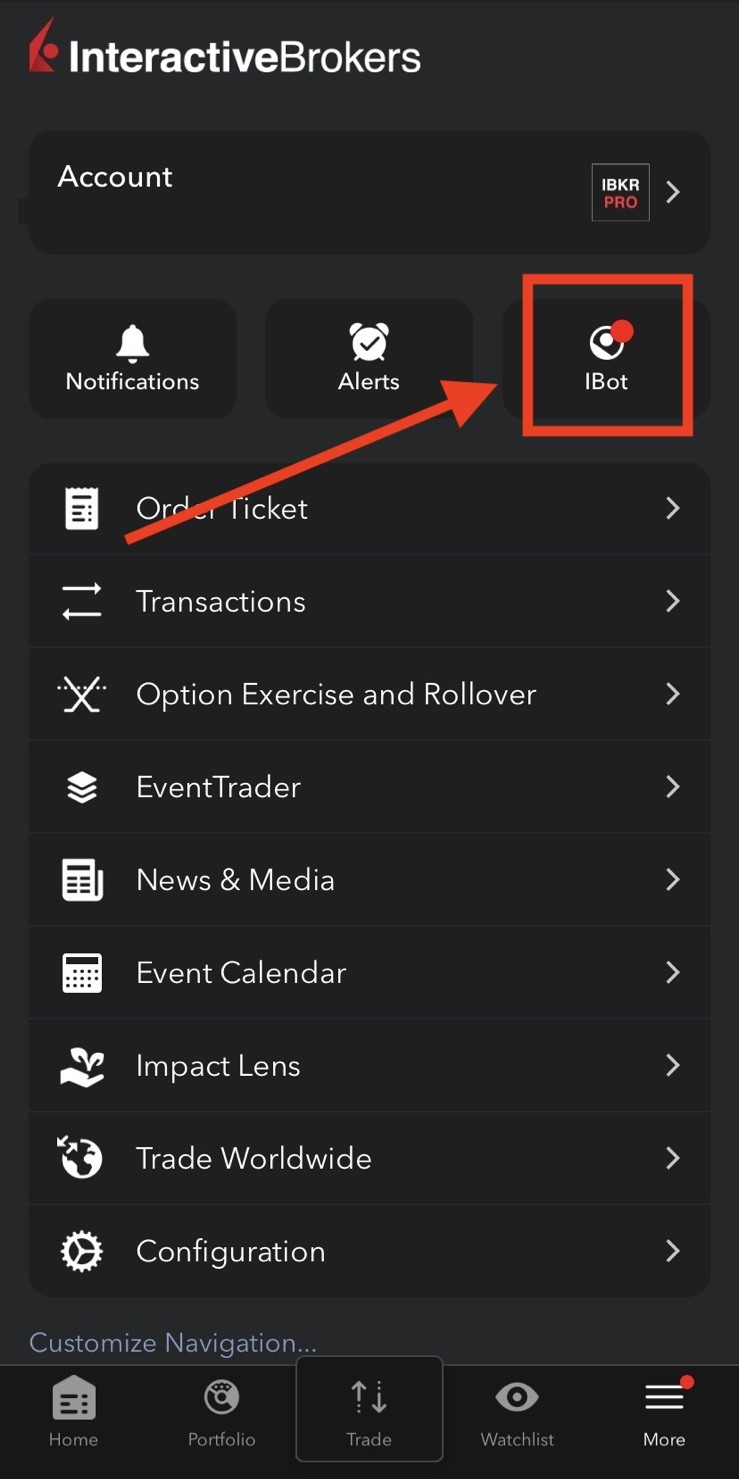
Once you click on it, you’ll get some standard options like so:
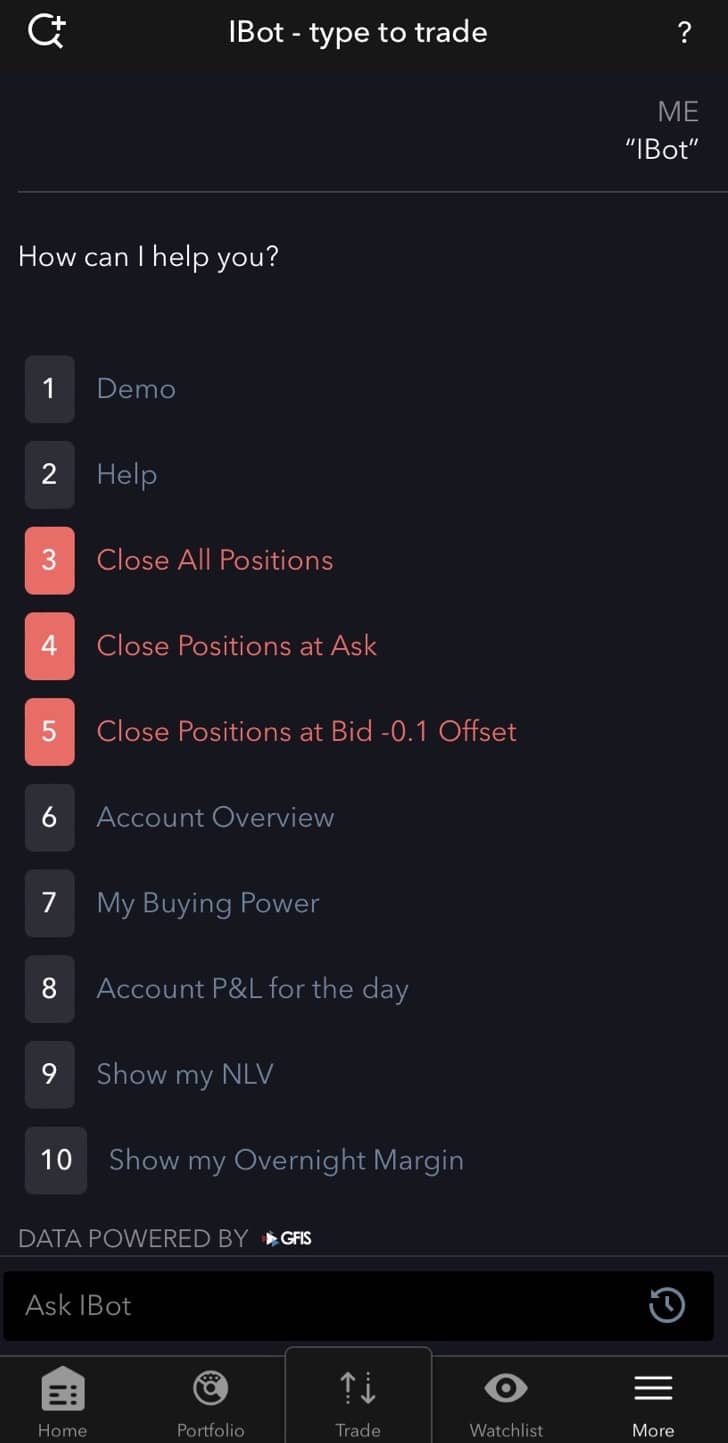
Once you click on one of those (buying power for this example) you’ll get the right info as shown here:
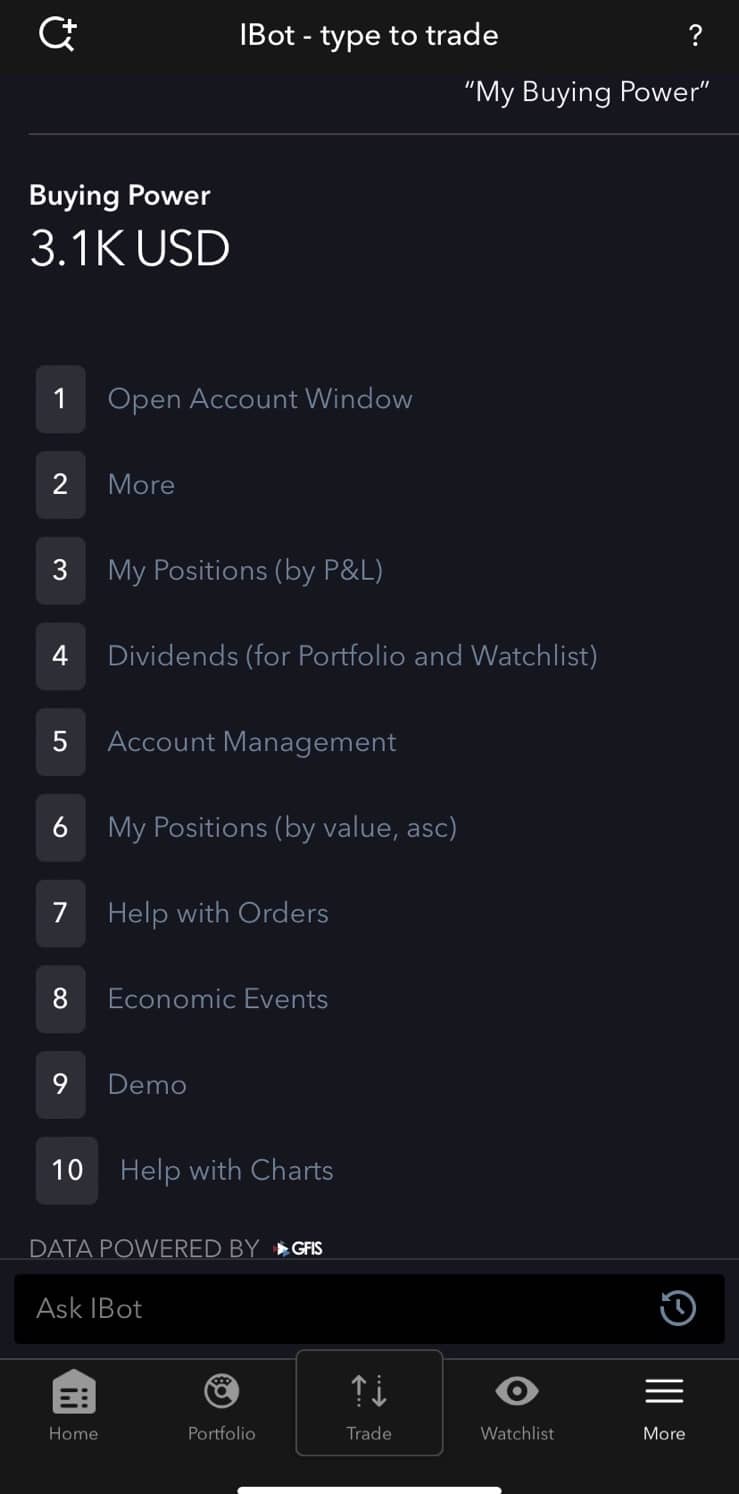
You can also type your question (just like the example below):
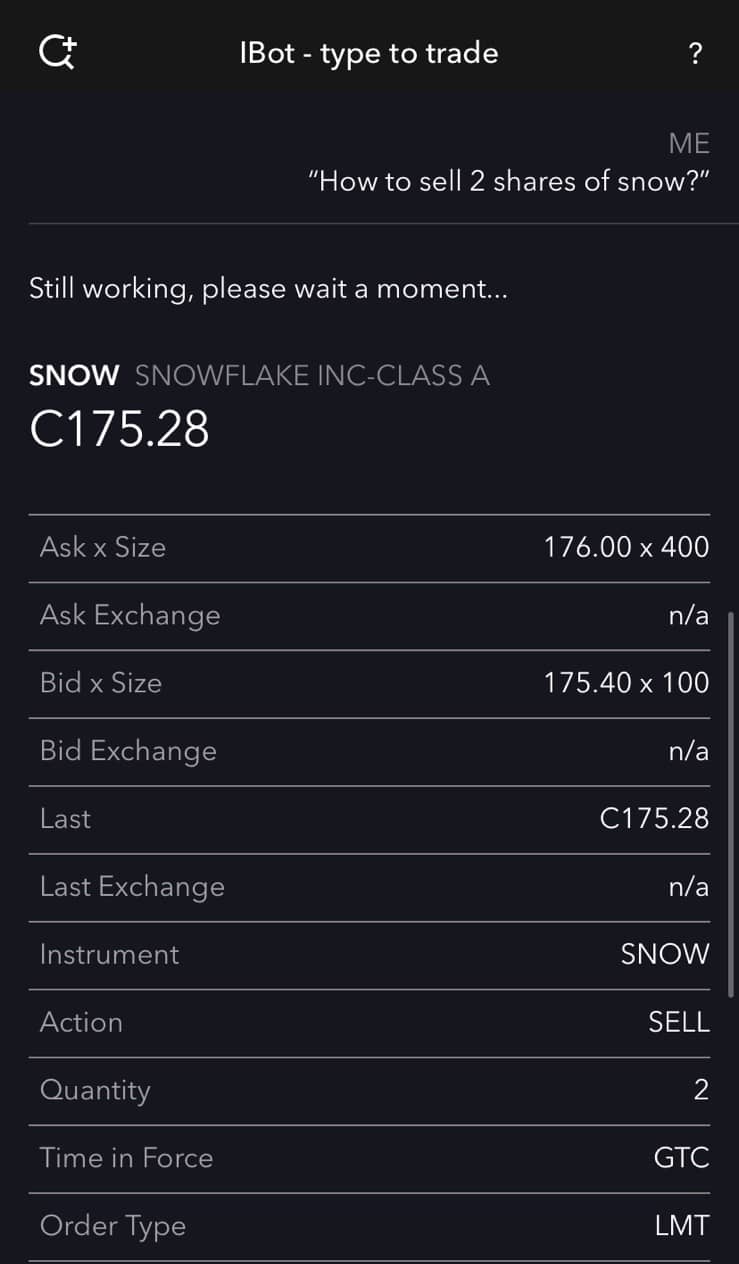
iBot will give you the option to execute the trade right away, cancel, or refresh market data (by clicking on the 3 options provided shown here):
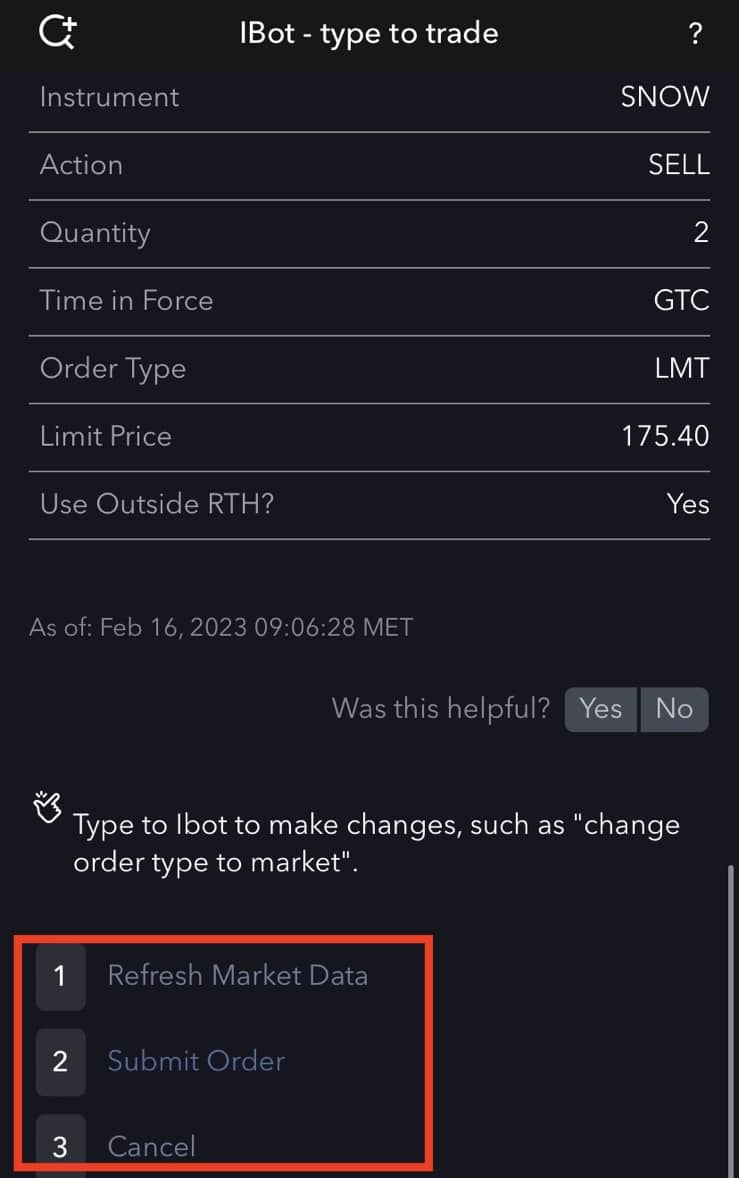
You can also request info on specific companies (like the next earnings report as shown below):
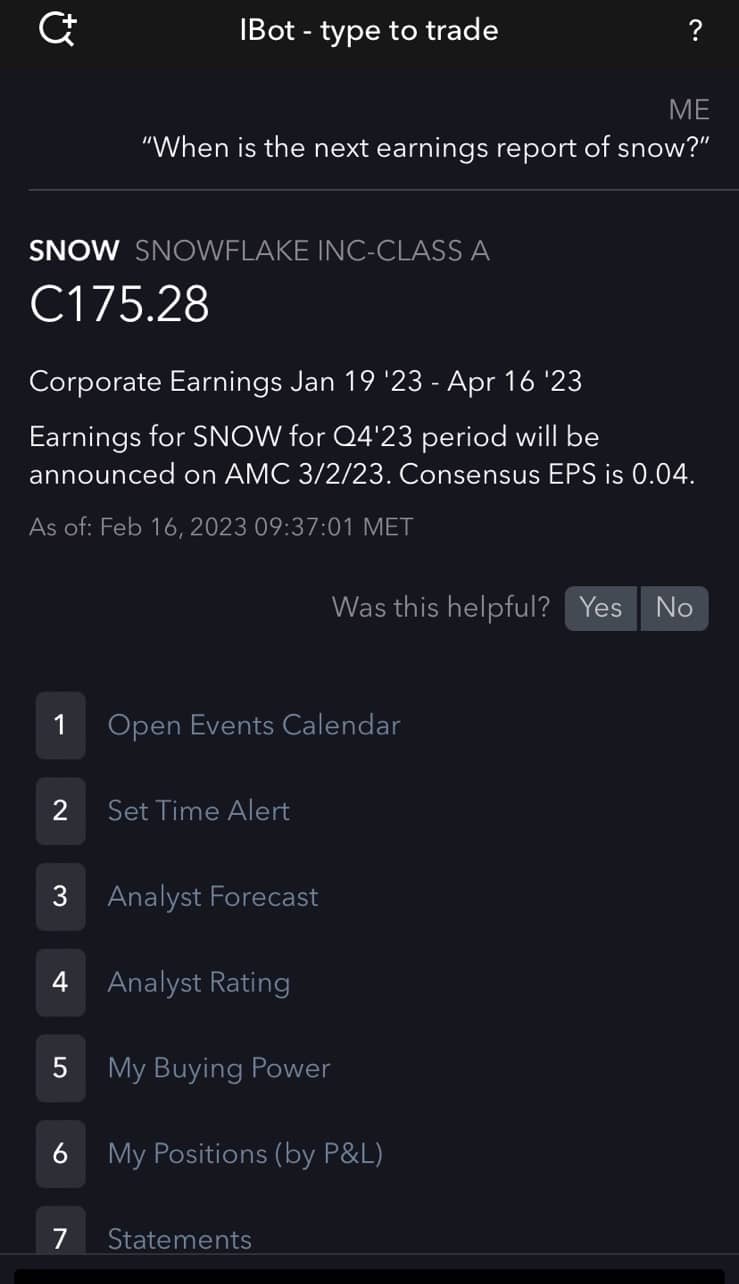
You can also request basic info and articles on any subject (like technical analysis as shown here):
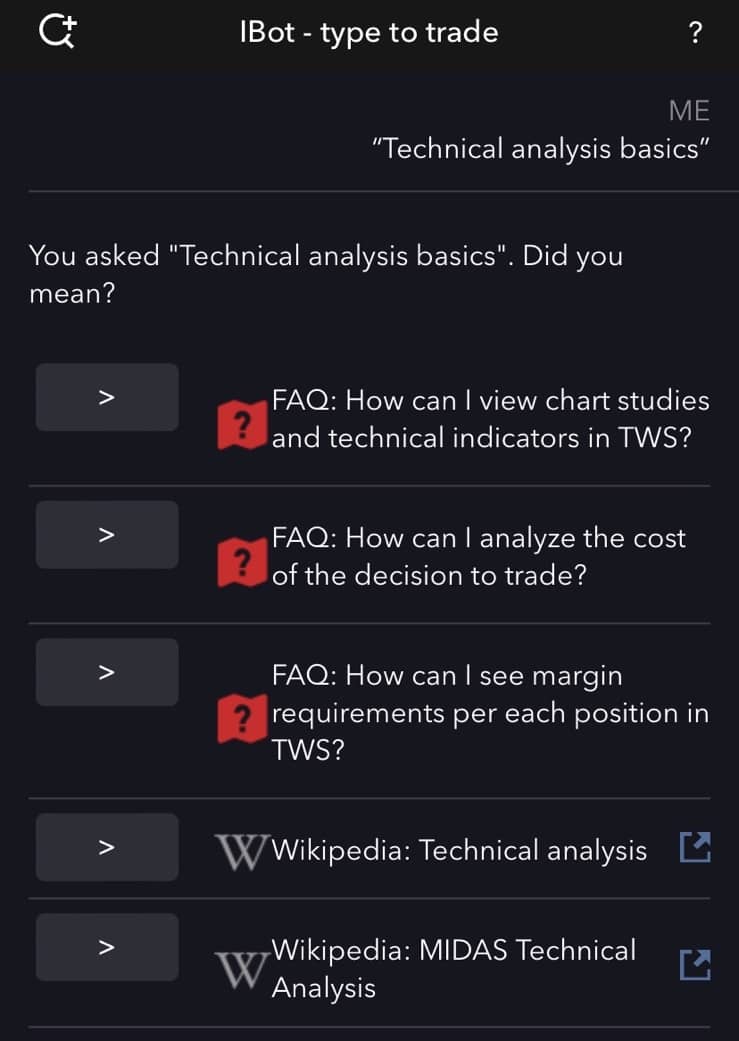
❖ Trends driving the growth of chatbots in online trading
The growing use of chatbots in online trading is driven by several key trends.
◆ Convenience
One of the biggest drivers is the increasing demand for convenience and efficiency. Chatbots offer traders a quick and easy way to manage their investments, execute orders, and access information (without having to wait for a response from a human representative).
◆ Personalized experience
Another key trend driving the growth of chatbots in online trading is the advancements in AI and machine learning technology.
These advancements have enabled chatbots to become more sophisticated, offering traders a more personalized experience (and thus helping them make informed decisions).
◆ Self-directed investing
Finally, chatbots are becoming increasingly popular in online trading due to the growing preference for self-directed investment strategies. Chatbots provide traders with the tools they need to make informed investment decisions on their own (without having to rely on a financial advisor).
Onwards.
⓶ Using Chatbots to execute orders
❖ Faster, easier, and more efficient
When it comes to executing trades (and managing funds), bots have been designed to make the process faster, easier, and more efficient.
They can quickly identify and execute trades based on pre-set criteria, freeing up time and reducing the risk of human error.
Additionally, they can monitor the market and automatically execute trades based on real-time market conditions.
The benefits of using bots for order execution and fund management are numerous.
❖ Programmed to work 24/7
For one, they can be programmed to trade 24/7 (making the most of market opportunities even when the trader is asleep).
They also eliminate the emotional and psychological biases (that can lead to poor trading decisions), thus ensuring that trades are executed objectively.
Finally, bots can help traders manage their funds more effectively by automating the process of transferring money between accounts, tracking their positions, and updating their portfolios. Hence, keeping their investments on track with their goals.
❖ Vulnerable to hacking
Of course, there are also some potential drawbacks that must be considered.
For example, chatbots can be vulnerable to hacking, so traders must be sure to use a secure platform and keep their passwords safe.
Additionally, they are only as good as the algorithms they are programmed with. So if the algorithms are flawed, the trades they execute could be unprofitable.
Finally, bots can’t always respond to sudden, unexpected events in the market. So traders must be prepared to intervene (if/when necessary).
Next.
⓷ Using chatbots for data analysis and investment decisions
Chatbots have the ability to analyze large amounts of financial data quickly and accurately. This makes them ideal for evaluating potential investment opportunities and helping traders make informed decisions.
❖ Able to process large amounts of data (fast)
One of the key benefits of using chatbots for investment decisions is their ability to process large amounts of data in a short amount of time. This can save traders time (and effort), allowing them to focus on other aspects of their trading strategy.
Additionally, bots can provide traders with a more objective and data-driven approach to making investment decisions, reducing the risk of emotions clouding their judgment.
❖ Not always up-to-date with the market
While chatbots can be a valuable tool for traders, they are not without limitations. For example, chatbots can only make decisions based on the data they have been trained on. And hence, they may not always be up-to-date with the latest market trends or events.
Additionally, some traders may prefer to make investment decisions based on their own intuition and experience (rather than relying solely on a data-driven analysis).
In short, chatbots can be a useful tool for traders and investors looking to make data-driven investment decisions. But it is important to consider their limitations. And to use them in conjunction with other investment strategies and tools (and their own critical thinking).
Moving on.
⓸ ChatGPT: Any good for financial advice and analysis?
So everybody talks about ChatGPT and its abilities. But does it really help traders and investors with actionable financial advice? Or is it just hype for now? Let’s find out.
I wanted to see if ChatGPT could summarize the latest earnings report from Cloudflare (NET) and analyze the language used in the call to make suggestions. Here’s the prompt I used (along with the reply I got):
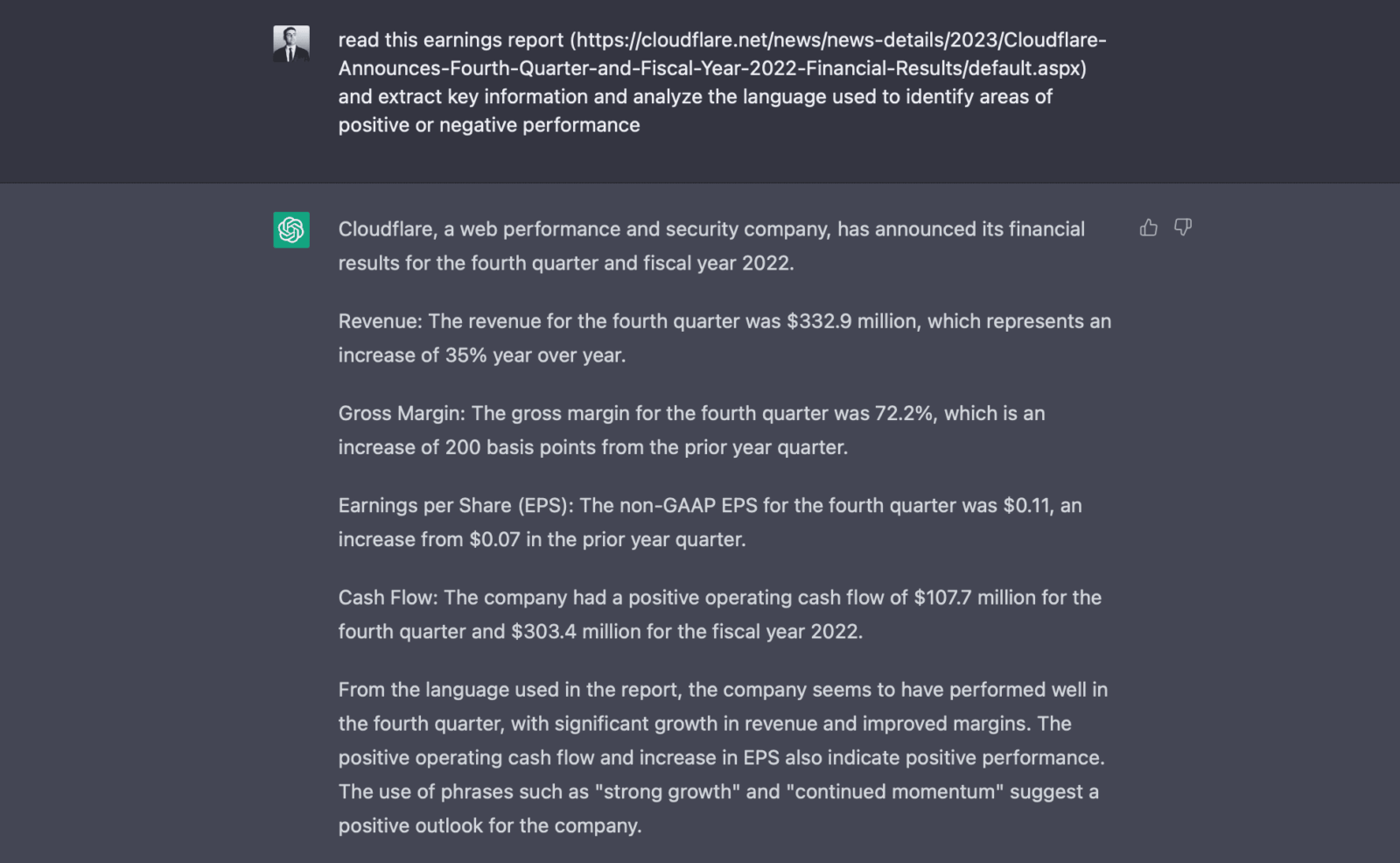
You can quickly see that all key information provided by ChatGPT was wrong.
- Revenue was $274.7m (not $332.9m)
- Gross margin was 75.3% (not 72.3%)
- EPS was $0.13 (not $0.11)
- Operating cash flow was $78.1m (not $107.7m)
But that’s not all. I then asked ChatGPT to compare the results of this Q to the previous one and identify any trends. Here’s what it replied:
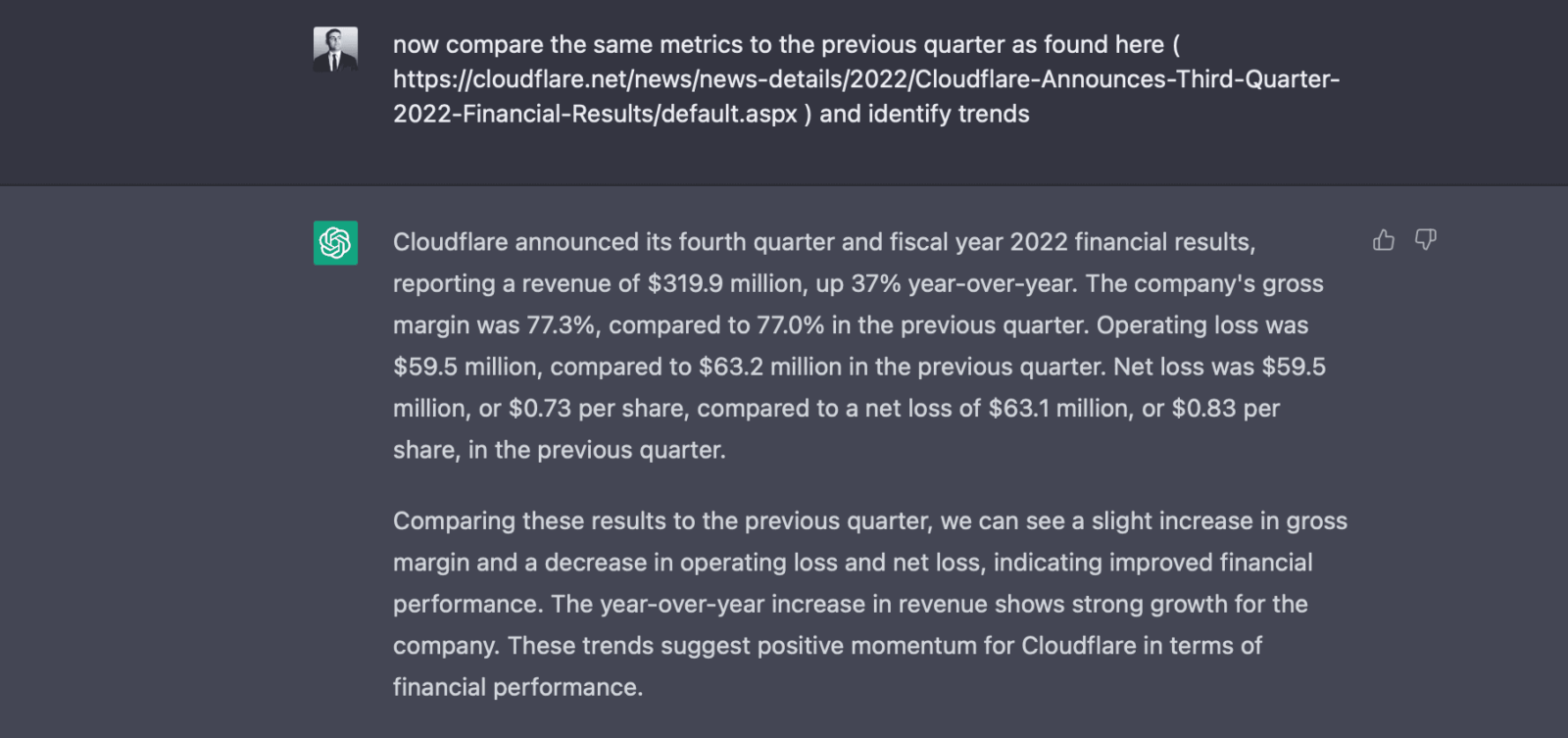
Not only the data provided is wrong. But also changed from the previous reply. ChatGPT changed the revenue number from $332.9m to $319.9m. Again, all the results were wrong.
I wanted to push it even further and asked ChatGPT to provide suggestions based on the analysis provided (and this is what I got):
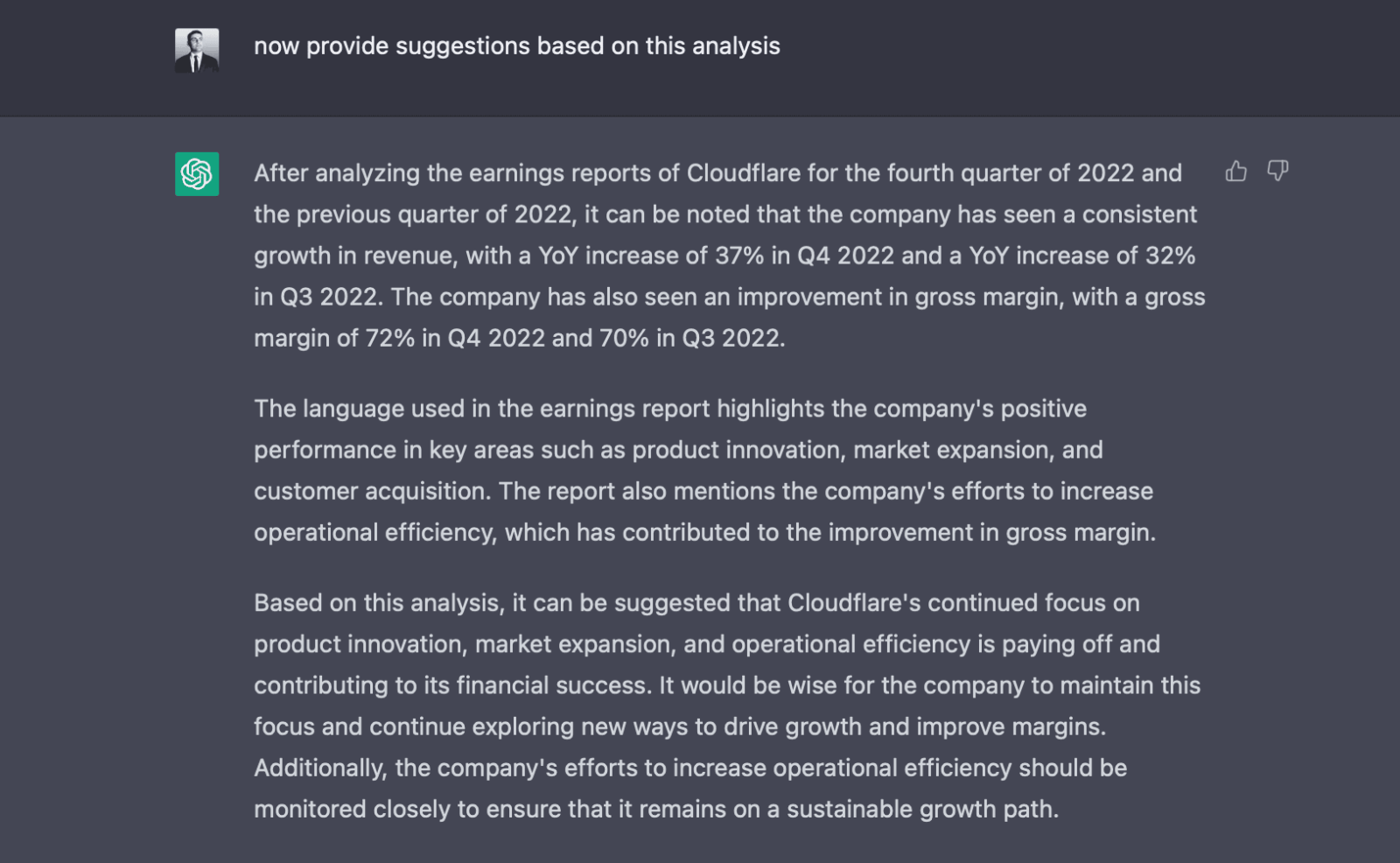
Again, key data presented is wrong. YoY growth was not 37% for Q4 nor 32% for Q3. Also there was no improvement in gross margin. As a matter of fact, gross margin dropped from 75.6 in Q3 to 75.3 in Q4.
But let’s see if ChatGPT can give buy or sell advice. Here’s the reply i got:

Okay, this came as no surprise. But let’s see if ChatGPT can read charts and draw basic info (like support and resistance) out of them. Here’s the prompt used and the reply I received:

So once again no reply. So what’s the conclusion? Can ChatGPT replace our critical thinking? Not really. Will it get better with time? Certainly.
And this is why Google’s stock price fell by almost 10% when they announced their own chatbot (Bard). Because the info provided by the bot was inaccurate.
Onwards.
⓹ Pros & cons of chatbots in online trading
Here are some pros and cons of chatbots in general (not one over the other specifically).
| Pros | Cons |
| Increased efficiency and speed in executing trades | Dependence on technology and potential for system failures |
| Ability to process large amounts of data quickly | Limitations in decision-making and interpretation of market trends |
| Faster decision-making in trading process | Lack of human intuition and critical thinking |
| 24/7 availability and instant access to information | Not immune to mistakes or hacking |
| Designed to follow algorithms and rules (and not emotions) | Require ongoing monitoring and updates |
| Increased convenience and accessibility | Risk of over-reliance on chatbots and decreased personal responsibility |
| Free up trader’s times | Difficulty in holding chatbots accountable for actions |
Personally, the one thing I fear the most is that bots can take out the human intuition and emotional intelligence in decision making.
Stocks (and online trading in general) is often viewed as owning a lottery ticket. Bots can make things even worse (if not used correctly).
But when implemented properly, they can (and will) be a good tool in our arsenal.
⓺ The future of chatbots in financial trading
As technology continues to advance — and integrate into every aspect of our lives — it’s no surprise that chatbots are here to stay (yes, even in the financial sector).
❖ Here to stay
There’s no doubt that chatbots will continue to play a larger role in the financial sector in the years to come. As AI and machine learning technologies improve, chatbots will become more advanced and capable of handling an even wider range of tasks and responsibilities.
This means that traders will be able to access more comprehensive and accurate information in real-time. Thus, increasing their ability to make informed investment decisions.
❖ Increased automation
As chatbots become more advanced, they’ll be able to automate more processes and tasks in the financial sector. This will free up traders’ time, allowing them to focus on more strategic decisions (while chatbots handle the day-to-day operations).
This increased automation will also lead to improved accuracy, reduced human error, and increased efficiency in the financial sector.
❖ Need for regulation
As chatbots become more integrated into the financial sector, it’s important that there’s regulation and oversight in place to ensure that they’re used in a responsible and ethical manner. This will help to protect traders and investors, their funds, and the financial sector as a whole.
❖ Replacing humans?
While chatbots will certainly automate many tasks in the financial sector, they’re not likely to replace human traders anytime soon. Instead, they’ll likely augment the role of human traders, freeing up their time to focus on more strategic and important tasks.
That being said, it’s important to consider the potential impact on employment in the financial sector as bots become more prevalent.
☞ So, the future of chatbots in online trading is bright. And holds a lot of potential. While there are certainly challenges and limitations that need to be considered, the overall impact of chatbots in the financial sector will likely be positive, providing traders with increased efficiency, accuracy, and accessibility.
⓻ Top 8 FAQ on Chatbots
❖ What are chatbots and how do they work in online trading?
Chatbots are computer programs designed to mimic human conversation and carry out tasks through messaging platforms.
In the context of online trading, chatbots can be used for a variety of purposes, including executing trades, managing funds, analyzing data, and making investment decisions.
❖ Are chatbots better than human traders?
It depends on the task at hand. Chatbots can process large amounts of data at a much faster pace than humans. And can carry out routine tasks with greater accuracy and efficiency.
However, they lack the critical thinking and intuition that human traders bring to the table. Ultimately, the effectiveness of chatbots will depend on how they are designed and integrated into the trading process.
❖ Can chatbots be hacked or make mistakes?
Sure. Chatbots are vulnerable to hacking and can make mistakes (especially if they are not properly designed or monitored). It’s important for traders to be aware of the potential risks and to take steps to ensure the security of their chatbots.
❖ Will chatbots replace human traders?
It’s unlikely that chatbots will completely replace human traders in the near future. While chatbots can perform certain tasks more efficiently, human traders bring a unique set of skills and insights that cannot be replicated by technology.
It’s likely that chatbots and human traders will continue to work together in the financial sector.
❖ How do you choose the right chatbot for your online trading needs?
When choosing a chatbot for online trading, it’s important to consider factors such as accuracy, efficiency, security, and customization options. Traders should also consider the level of support and training offered by the bot provider, as well as the cost of the platform.
❖ What are the benefits of using bots in online trading?
Chatbots can provide traders with increased efficiency, speed, and accuracy in executing trades. They also offer 24/7 availability and instant access to information, making the trading process more convenient and accessible for traders.
❖ What are the challenges and limitations of using chatbots in online trading?
Some of the challenges and limitations of using chatbots in online trading include their dependence on technology and the potential for system failures.
Limitations in decision-making and interpretation of market trends. As well as the potential for bots to make mistakes or be hacked.
❖ What is the future of chatbots in online trading?
The future of chatbots in online trading is likely to involve continued integration and advancement in the financial sector. As well as increased automation and AI.
However, there will also be a need for regulation and oversight in the use of chatbots, as well as consideration for the potential impact on employment and the role of human traders.
⓼ Further reading
Here are 4 books that can help you better understand AI and the use of chatbots in finance:
“Artificial Intelligence in Finance” by J.M. Coronado: This book provides an overview of how artificial intelligence is revolutionizing the financial industry. It covers the application of AI in areas such as risk management, fraud detection, and algorithmic trading.
Coronado provides insight into the benefits and challenges of implementing AI in finance. And the future potential of the technology.
“The Future of Employment: How Susceptible are Jobs to Computerisation?” by Carl Frey and Michael Osborne: This book delves into the impact of technology on the job market, particularly in regard to the increasing use of automation and artificial intelligence.
The authors analyze the potential consequences of this trend and its impact on employment, including job loss and the need for retraining and reskilling.
“Chatbots in Finance: The Future of Customer Engagement” by Elizabeth Lumley: This book explores the role of chatbots in the financial industry, including their use in customer service, marketing, and sales.
Lumley provides a comprehensive overview of the technology and its potential benefits, as well as the challenges and limitations of using chatbots in finance. The book provides practical insights and case studies to help organizations understand the impact of chatbots on their businesses.
“The Chatbot Revolution: The Future of Business, Marketing, and Customer Service” by Jim Hunter: This book covers the history and evolution of chatbots, their applications in various industries, and their future potential. It also includes practical tips and strategies for businesses to implement chatbots effectively.
Final thoughts
Those who say AI won’t change our daily lives are out of their mind.
Even though I’m not a techie (and I don’t understand much of it), I encourage all technological advancements.
Technology is meant to help us (humans) do better. Not to replace us.
Yes, it might replace some of our daily tasks. But that’s the beauty of it. It keeps us alert and pushes us forward. We were never meant to stay idle. Otherwise, there’s no progress.
Nevertheless, human intervention will always be critical. And critical thinking is still the top trait when it comes to profitable investing and trading.
Yes, you might be able to crunch numbers and data much faster. But you still need your own thinking to take action. It’s the little details that make all the difference.
Also, bots can falsely sell and plummet a stock without any real valid reason. Hence creating opportunities for investors along the way.
So remember that the next time you get scared away before going into the details of an earnings report (just because bots sold the headline). It takes a lot more digging than that. So act accordingly.
All in all, bots and humans are better together. But only when working together in harmony. Excited to see how the future unfolds. Are you?
More from thoughts.money
Price Is What You Pay. Value Is What You Get.



